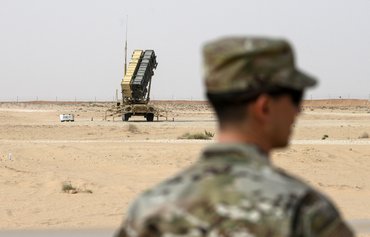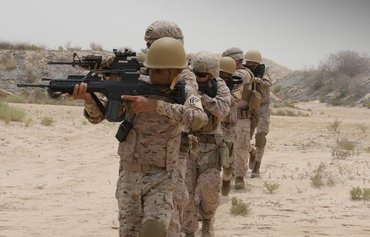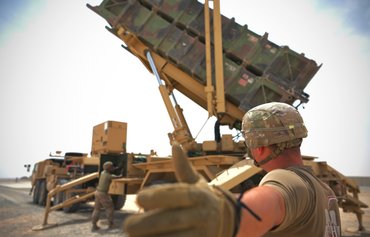The United States remains the leading partner in Saudi Arabia's defence acquisitions and training programme as the two nations continue to work together to counter Iranian and other threats to the region.
Despite recent tensions over Saudi Arabia's reluctance to take sides in Russia's war on Ukraine and its deepening relations with China, both seem to be focused on maintaining their long established and extensive relationship, observers say.
In mid-March, the United States and Saudi Arabia completed their first joint counter-drone exercise at a new military testing centre in Riyadh, according to the US military's Central Command (CENTCOM).
The "Red Sands" exercise was the first of its kind between the two militaries, Al-Arabiya reported March 24.
![A member of the US Air Force looks on near a Patriot missile battery at the Prince Sultan air base in Al-Kharj, Saudi Arabia, in 2020. [Andrew Caballero-Reynolds/AFP]](/cnmi_am/images/2023/05/05/41862-000_1p5562__1_-600_384.jpg)
A member of the US Air Force looks on near a Patriot missile battery at the Prince Sultan air base in Al-Kharj, Saudi Arabia, in 2020. [Andrew Caballero-Reynolds/AFP]
![The air forces of Saudi Arabia, the United States, Bahrain and Pakistan participated in the 10-day Spears of Victory 2022 military exercise at the Air War Centre at King Abdulaziz Air Base in eastern Saudi Arabia. [Saudi Defence Ministry]](/cnmi_am/images/2023/05/05/41861-spear-2022-600_384.jpg)
The air forces of Saudi Arabia, the United States, Bahrain and Pakistan participated in the 10-day Spears of Victory 2022 military exercise at the Air War Centre at King Abdulaziz Air Base in eastern Saudi Arabia. [Saudi Defence Ministry]
The counter-drone drills involved live-fire exercises and allowed for studying complex threats and identifying weaknesses in other areas to counter drone activities, CENTCOM commander Gen. Michael "Erik" Kurilla said March 23.
The exercise was an important way for the United States to show continued commitment to Saudi Arabia, Melissa Horvath, a non-resident senior fellow at the Middle East Institute (MEI), told Al-Arabiya.
It also allows the United States to build regional co-operation among Middle East allies in ways that go beyond traditional security assistance programmes such as foreign military sales, she said.
Critical security partner
Bilateral relations between United States and Saudi Arabia began in 1933 when full diplomatic relations were established, and in 1951, they entered into their first formal defence pact, the Mutual Defence Assistance Agreement, which provided for US arms sales to Saudi Arabia and US training of the Saudi military.
Since then, the United States has remained a critical security partner for Saudi Arabia, which is its largest foreign military sales customer.
Saudi Arabia is the primary destination for US arms sales, according to the Council on Foreign Relations, with the kingdom purchasing nearly 10% of US exports from 2011 to 2015.
Per the Stockholm International Peace Research Institute, 78% of the kingdom's total arms imports came from the United States between 2018 and 2022.
In 2017, the United States signed a $350 billion, 10-year arms deal with Saudi Arabia that began with an immediate $110 billion in US sales to the kingdom.
As part of the deal, the two countries signed two military contracts totalling more than $1.4 billion to counter any threat from Iran and help support the long-term security of US partners in the Gulf region.
This included a $750 million contract to train the Saudi air force, working with a variety of US contracted firms.
It also included $662 million that the kingdom would spend on 26 AN/TPQ-53(V) truck-mounted medium-range radar systems, which can pinpoint enemy mortar and missile batteries, AFP reported.
Also in 2017, the US government approved the sale to Saudi Arabia of the advanced Terminal High Altitude Area Defence (THAAD) missile defence system for $15 billion.
"The United States is and remains the critical security partner for Saudi Arabia," David Satterfield, director of Rice University's Baker Institute for Public Policy, told Politico in August 2022.
This is because "Iran remains critical as the most significant single source of threat to Saudi Arabia and beyond", he said.
Common interests
"The United States and Saudi Arabia have a common interest in preserving the stability, security and prosperity of the Gulf region," according to a US State Department Bureau of Near Eastern Affairs fact sheet issued in May 2022.
Through foreign military sales, the United States "has supported three key security assistance organisations in Saudi Arabia -- the Ministry of Defence, the National Guard and the Ministry of Interior", it said.
"Since the 1950s, the US Army Corps of Engineers has also played a vital role in military and civilian construction in Saudi Arabia," it added.
Despite recent tensions, "both parties seem to be focused on maintaining the relationship", especially in regards to security co-operation and training, Sussan Saikali of the Arab Gulf States Institute in Washington, wrote last June.
"A stronger US-Saudi security relationship serves both parties, and ultimately, regional stability," MEI senior fellows Kevin Donegan and Bilal Y. Saab wrote for Defense One on April 5.
"For Washington, a Saudi Arabia that can defend itself, is capable of operating with US forces, and can provide meaningful contributions to regional security is in the US national interest," they said.
"A more capable Saudi Arabia also frees the United States to put more military resources in the Indo-Pacific and European theatres," they added.
"For Saudi Arabia, the United States is the only country that can help Riyadh achieve its defence restructuring goals and pull other regional partners into any sort of effective regional defence coalition."
Even with the recent China-brokered deal between Saudi Arabia and Iran, they said, "Saudi leaders know full well that although Beijing can sell military hardware (not very good hardware), it simply cannot offer geopolitical leadership like Washington".

![US and Saudi tanks take part in the "Eager Lion" multinational military drill in Jordan on September 14, 2022. [Khalil Mazraawi/AFP]](/cnmi_am/images/2023/05/05/41856-Eager-Lion-Jordan-600_384.jpg)






